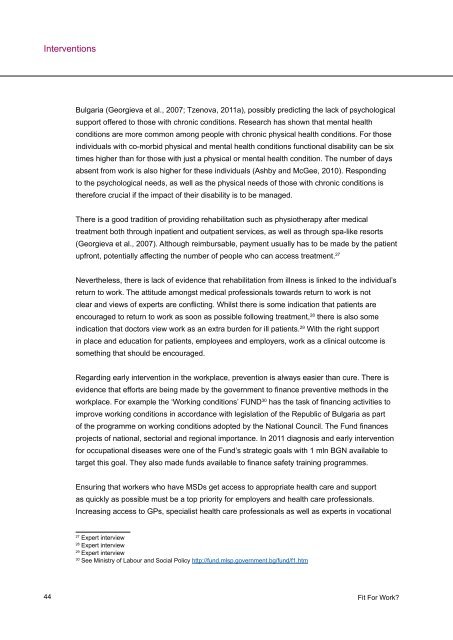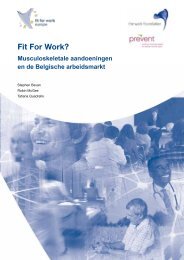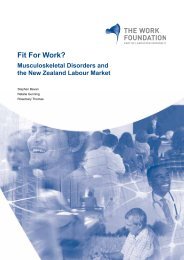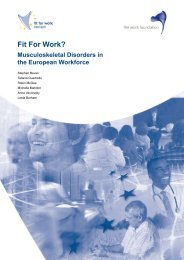FfW Bulgarian report (English language) - Fit for Work Europe
FfW Bulgarian report (English language) - Fit for Work Europe
FfW Bulgarian report (English language) - Fit for Work Europe
You also want an ePaper? Increase the reach of your titles
YUMPU automatically turns print PDFs into web optimized ePapers that Google loves.
Interventions<br />
44<br />
Bulgaria (Georgieva et al., 2007; Tzenova, 2011a), possibly predicting the lack of psychological<br />
support offered to those with chronic conditions. Research has shown that mental health<br />
conditions are more common among people with chronic physical health conditions. For those<br />
individuals with co-morbid physical and mental health conditions functional disability can be six<br />
times higher than <strong>for</strong> those with just a physical or mental health condition. The number of days<br />
absent from work is also higher <strong>for</strong> these individuals (Ashby and McGee, 2010). Responding<br />
to the psychological needs, as well as the physical needs of those with chronic conditions is<br />
there<strong>for</strong>e crucial if the impact of their disability is to be managed.<br />
There is a good tradition of providing rehabilitation such as physiotherapy after medical<br />
treatment both through inpatient and outpatient services, as well as through spa-like resorts<br />
(Georgieva et al., 2007). Although reimbursable, payment usually has to be made by the patient<br />
upfront, potentially affecting the number of people who can access treatment. 27<br />
Nevertheless, there is lack of evidence that rehabilitation from illness is linked to the individual’s<br />
return to work. The attitude amongst medical professionals towards return to work is not<br />
clear and views of experts are conflicting. Whilst there is some indication that patients are<br />
encouraged to return to work as soon as possible following treatment, 28 there is also some<br />
indication that doctors view work as an extra burden <strong>for</strong> ill patients. 29 With the right support<br />
in place and education <strong>for</strong> patients, employees and employers, work as a clinical outcome is<br />
something that should be encouraged.<br />
Regarding early intervention in the workplace, prevention is always easier than cure. There is<br />
evidence that ef<strong>for</strong>ts are being made by the government to finance preventive methods in the<br />
workplace. For example the ‘<strong>Work</strong>ing conditions’ FUND30 has the task of financing activities to<br />
improve working conditions in accordance with legislation of the Republic of Bulgaria as part<br />
of the programme on working conditions adopted by the National Council. The Fund finances<br />
projects of national, sectorial and regional importance. In 2011 diagnosis and early intervention<br />
<strong>for</strong> occupational diseases were one of the Fund’s strategic goals with 1 mln BGN available to<br />
target this goal. They also made funds available to finance safety training programmes.<br />
Ensuring that workers who have MSDs get access to appropriate health care and support<br />
as quickly as possible must be a top priority <strong>for</strong> employers and health care professionals.<br />
Increasing access to GPs, specialist health care professionals as well as experts in vocational<br />
27 Expert interview<br />
28 Expert interview<br />
29 Expert interview<br />
30 See Ministry of Labour and Social Policy http://fund.mlsp.government.bg/fund/f1.htm<br />
<strong>Fit</strong> For <strong>Work</strong>?







